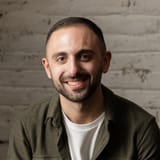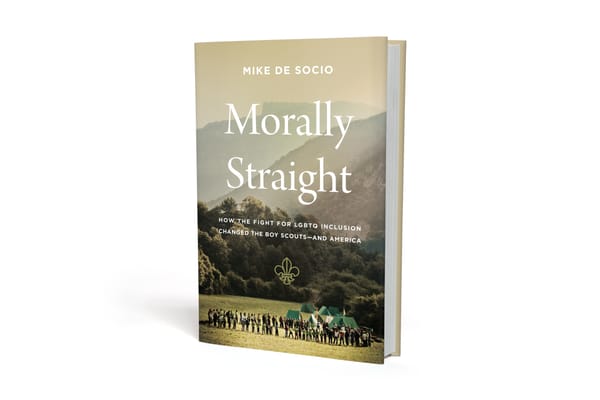Live from the National Order of the Arrow Conference
Inside the ArrowPride space, scouts are learning what it's like to be loved, affirmed and fully welcomed with all of their identities.
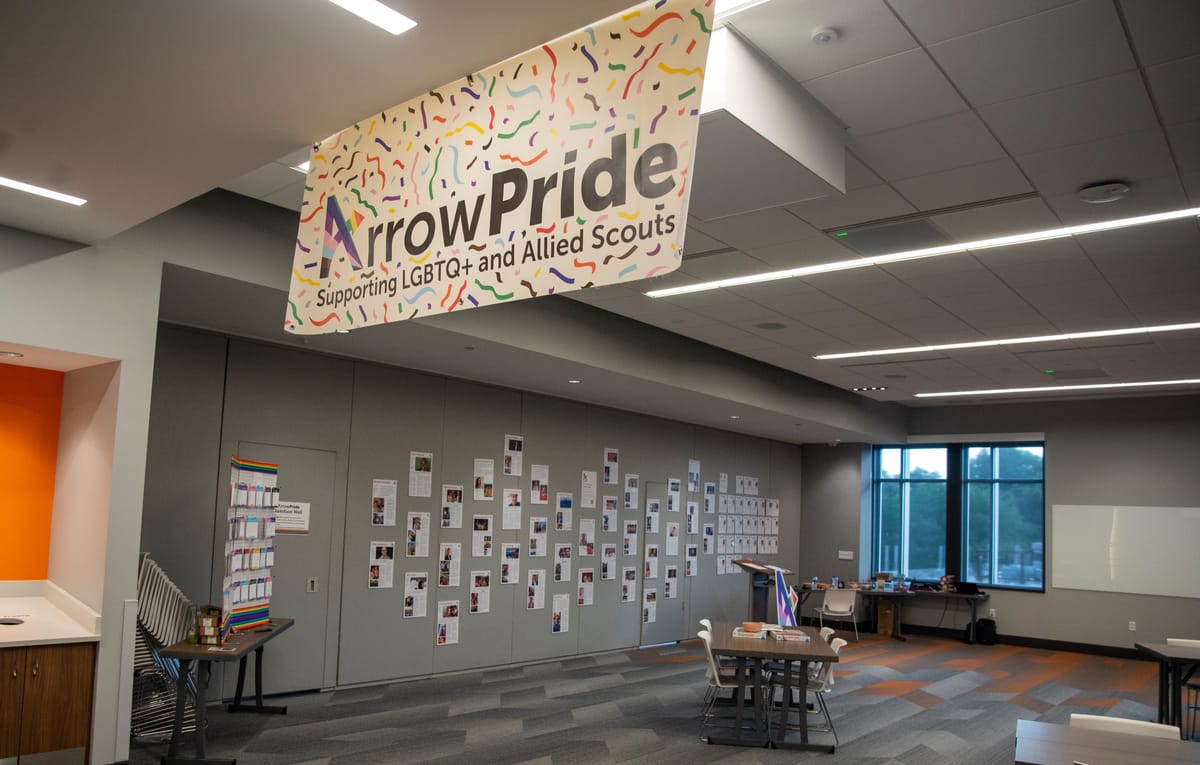
During any other week, the space I’m standing in would be rather unremarkable. It’s a third-floor meeting room at the University of Tennessee’s gleaming glass-and-brick Student Union building. The university’s official color — a tangy orange — is stitched into the carpets and the seat cushions, splashed about just enough to break up the monotony of the gray surfaces all around us.
We’ve done our own amount of decorating, too. Three LGBTQ+ pride flags hang from the ceiling, their bright hues adding another pop of color. We've set out bowls of rainbow stickers, bracelets, patches and pins. Posters cover most of the remaining wall space.
It’s Monday at the National Order of the Arrow Conference, and we’re not supposed to open the doors to this room until 2 p.m. But by 1:45, the wall of glass that separates us from the hallway reveals a small crowd of scouts waiting outside our doors. They’ve stepped off planes and buses mere hours ago, and this is among their first stops on campus. We all shrug and decide, why not, they can come in early.
About a dozen scouts amble in all at once, sucked like a magnet toward the activity closest to the doors: The question board. As they write and hang their responses to prompts like, “What is your wish for future generations of LGBTQ+ scouts?” and “What is something you would tell your younger self?,” more delegates filter in.
Within minutes, the number of people in the room doubles.
By 2 p.m., the space is so packed that you must weave through hoards of guests to travel even a few feet. Scouts of seemingly every gender and hair color (some the fluorescent variety) vacuum up the rainbow trinkets on offer. I hear a scout gushing as she passes by, urging herself to keep in the tears: “Ahhh, don’t cry!” An adult volunteer corners me to tell me how happy she is that something like this exists—finally. I quickly become the one of the most popular people in the room, on account of the free rainbow patches I’m now handing out to anyone who wants them. A region chief palms one and immediately hangs it from his shirt pocket, with not a moment of hesitation.
This room, of course, is ArrowPride. It is the first official LGBTQ+ affinity space at a national Scouting event, and we’ve invited the delegates to attend our ribbon-cutting. The crowds of young scouts, however, are not the only notable attendees. The OA’s top brass and its national officers are here too, and will soon be among the dozen dignitaries holding scissors at the rainbow ribbon that stretches across the room.
First up to the mic is Austin Clark, the youth lead of the ArrowPride space. He thanks the volunteers, delegates and professionals in attendance, and urges the room to step up and be their fully authentic selves this week.
“The way I see it, no scout can truly live up to the first point of the Scout Law — a scout is trustworthy — if they can't be true to themselves,” he says.
Clark passes the mic to Rich Whitney, a gay Scouter who left the program for 25 years, only to rejoin in 2016 after the membership ban fell. He shares the pain of leaving behind a major piece of his identity, and the unbridled happiness of his return.
“I can barely breathe, as you can tell, thinking about the joy that this program gives me,” Whitney tells the crowd. He talks about the program’s duty to move forward and fully embrace young members. “LGBT peoples are not new in Scouting. We've been here all along. But now you can see us, because we see we have a space.”
Last at the podium before the ribbon comes down is Dwayne Fontenette, Jr., a good friend of mine and the driving force behind the diversity, equity and inclusion work in the OA.
“There will be young people here this week who have never known what it's like to be loved, to feel affirmed in their identities for who they are. Some of them may live in homes that aren't loving, or attend schools that aren't affirming. But this week, by creating this thing, we're sending a message that LGBTQ belong in Scouting,” he says. “Thank you all for being here. Show your pride this week, and let's give young people hope.”
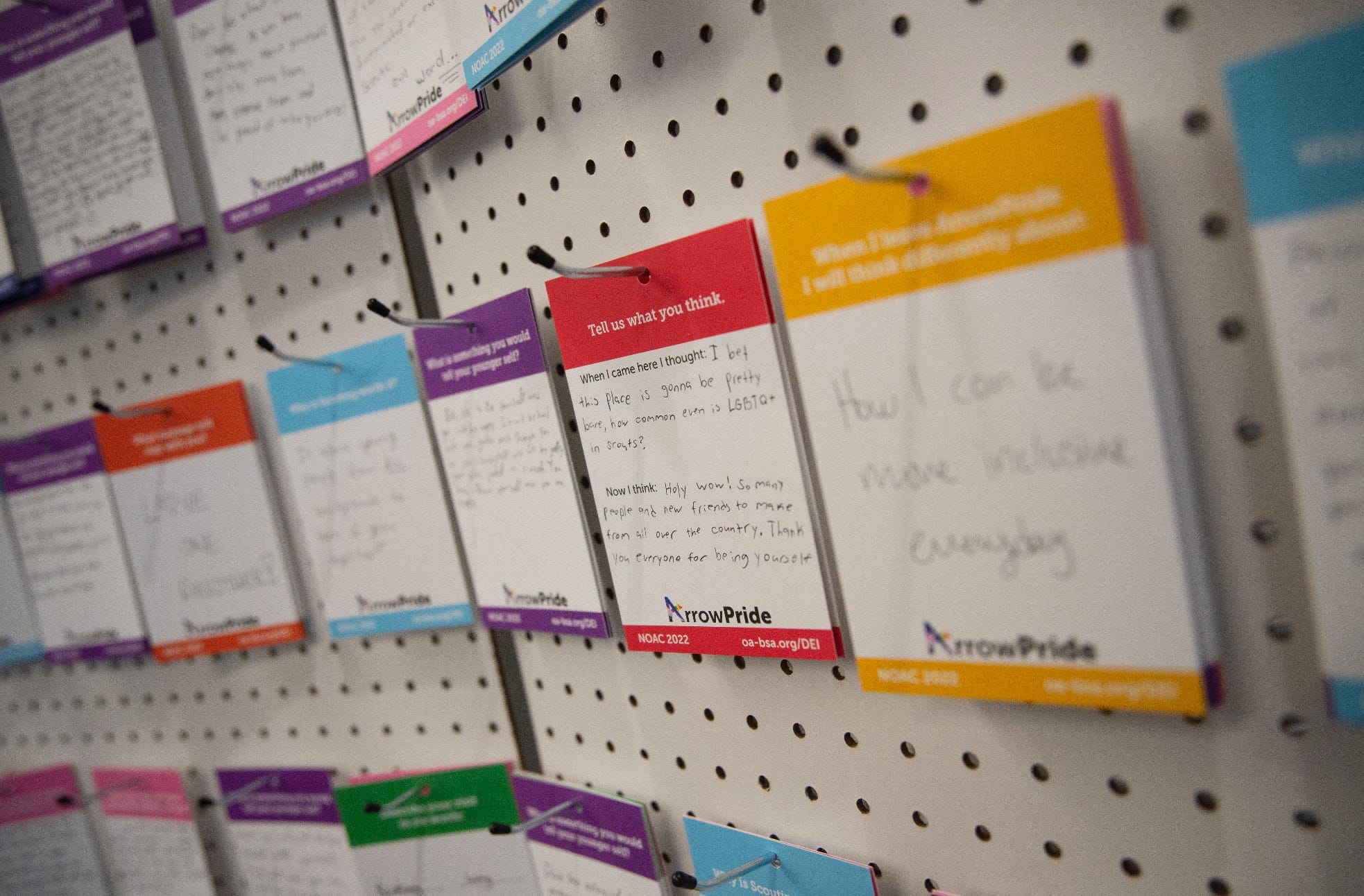
Visibility and possibility
In the days since the ribbon cutting, my time at the conference has been a whirlwind. I’ll be digesting the experiences of this past week at NOAC and ArrowPride for many months to come. I couldn’t possibly do justice to all of these powerful stories in a single newsletter (much less one I’m writing at the margins of a jam-packed conference schedule). So for now, I want to share a few more of the moments and takeaways that stood out to me this week:
- The youth are on the front lines, figuring it out. I sat in on a training on Tuesday designed to teach scouts about equitable leadership. The first hour of the session focused on the basics of diversity, equity and inclusion. But I had the distinct impression that these kids didn’t need to be sold on DEI. Many of them were already in the thick of it, and eager to find answers to tricky questions. More than one said they wanted to know how to make their units more welcoming. Some shared successes and failures from their attempts at operationalizing inclusion. As the mic was passed through the rows, I noticed that the training wasn’t hewing all that closely to the agenda, but it almost didn’t matter. These were folks who simply needed a space to work out their problems in the presence of peers who were trying to do the same.
- The youth are soaking it all in. About an hour before the affinity spaces closed one afternoon, I took a spin through each room to get a sense for how things were going. As I moseyed around, I saw a common sight in each space. Scouts were crowded around tables, playing board games, buzzing with laughter. Scouts were filling the walls with Polaroid portraits. And at one table, scouts were raving about what they had learned at a presentation earlier in the day: That in some Native American languages, pronouns have no gender. “That makes sense!” I heard one scout say. “Tell Spanish that!”
- The youth are not the only ones who need this. Without a doubt, the youth are the reason we worked so hard to create these spaces. But the youth are not the only ones who are benefiting. More than once this week, I had fellow adult staffers confide in me, telling me that they weren’t “just allies,” but members of the LGBTQ+ community themselves. In each case, I was beyond honored that they felt comfortable sharing their truths with me; there this nothing more special. And it also made me realize: The adults in the program need this space just as much as the youth — especially because some of them were forced to hide their identities for so long.
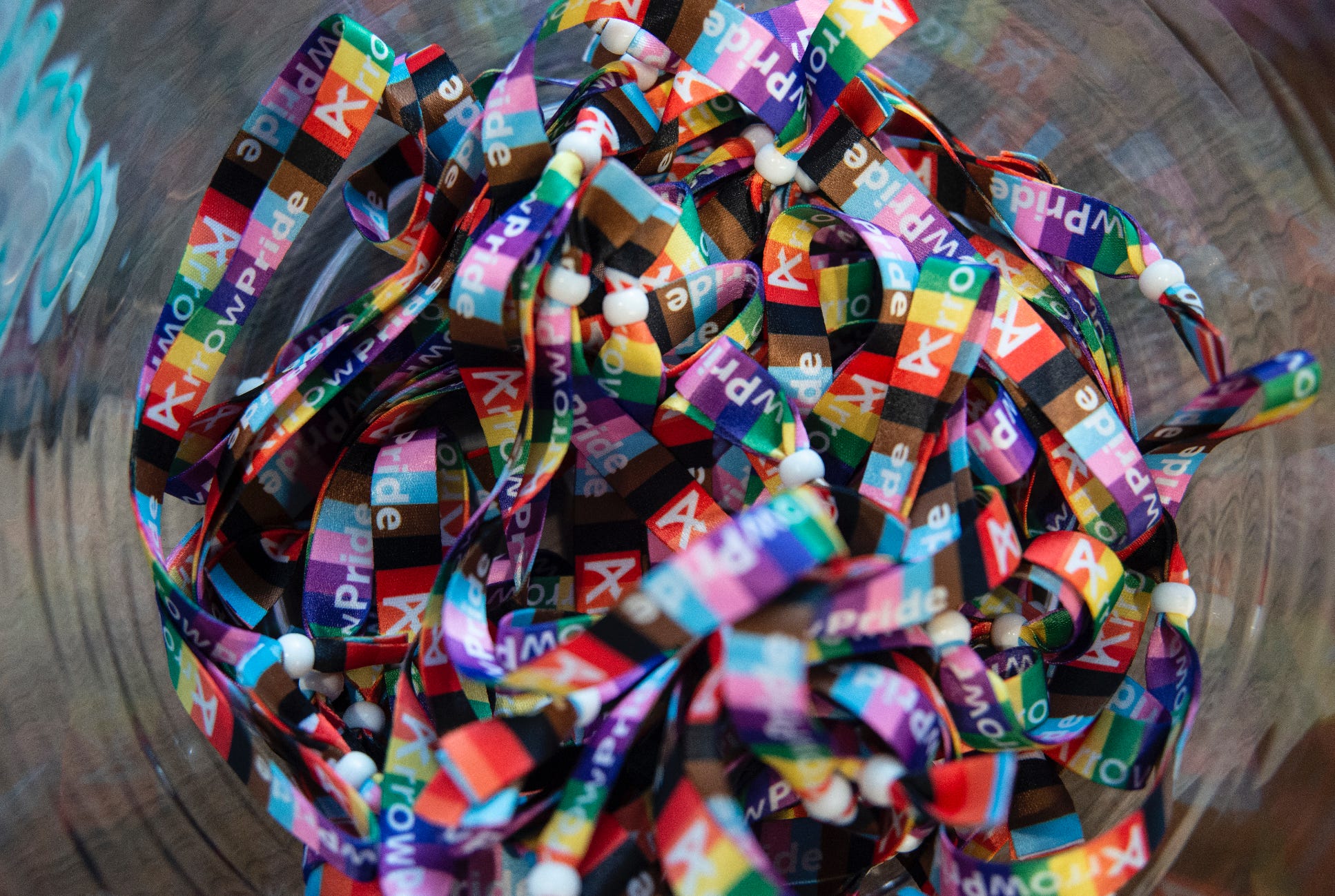
Setting a new standard
When I think about what I’ve seen unfold at NOAC this week, I keep returning to one simple, but powerful truth.
It came to me when I was browsing the wall of Pride Profiles in our space. Next to the posters I created and printed ahead of time, we invited delegates to create and post their own profiles using a fill-in-the-blank worksheet with space to attach a Polaroid snapshot of themselves.
One particular profile was written by a scout that identified as trans-femme. She mentioned in her response that this was her first conference, and first year in the OA. And she wrote that, though it look a long time for her to accept who she was, she’s found so much freedom on the other side. “The world is ours to make the change and I believe that we can do it together,” she said.
And that’s when it really began to click for me: This is a whole new generation of scouts — a very queer generation of scouts — that, if we play our cards right, won’t know anything but acceptance. Spaces like ArrowPride are a step in that direction. These first-time conference goers are learning that NOAC is a place that welcomes all parts of their identity with open arms.
That’s the truth that’s sticking with me. It sounds simple, doesn’t it? Almost basic on its own: Setting a standard of inclusion and acceptance. But this week, at this conference, it felt revolutionary. In a program that chose to exclude LGBTQ+ people for more than a century, it felt like we hit the reset button.
I don’t mean to say that everything is fixed now; certainly it isn’t. And unfortunately, many of these scouts will return home to environments rife with bigotry and discrimination. But for one week in Knoxville, at one of our organization’s premier events, we did something magical. We showed them what it was like to be loved.
